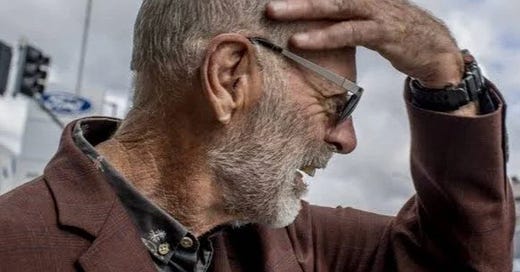As just another rate-paying Aucklander, I don’t need to actually like our mayor. He or she could be uninspiring or even distasteful, as far as I’m concerned, so long as he or she does the job without attracting my attention. The perfect mayor is a mayor whose name I struggle to recall – someone who just signs off budgets to fix cracks in footpaths and support local arts.
Auckland’s present mayor doesn’t follow this lofty ideal of civic virtue and modesty, preferring instead something akin to starring in his own bad movie. Persuading councillors to agree to sell shares in the Auckland airport company by circulating insulting emails didn’t get many laughs.
But, then again, we could try to view the Wayne Brown Show as true comedy, somewhere in between The Office and The Thick of It. In that case, maybe no one could’ve made a better casting choice than the one made by 16 percent of Aucklanders who actually voted for Wayne.
A few wealthy people funded his campaign, and an elderly propertied minority voted him in. They also shifted the political balance on the governing body rightwards. For example, ex-leftie Mike Lee, endorsed now by the centre-right Communities and Residents, regained his seat (Waitematā and Gulf) at the expense of the younger progressive Pippa Coom.
Indicative of the oligarchic priorities of Brown’s mayoralty is the absence from his proposed budget of any plan to diversify the uses of public golf courses, let alone to sell any of the valuable land they occupy. Auckland has 13 golf courses operating on 535 hectares of council-owned or managed land, valued at $2.9 billion in 2022. More diverse recreation and sports uses and housing have been considered as alternatives, but the golf-playing lobby is too strong. It successfully blocked efforts to redevelop, for example, the Chamberlain golf course in the western suburbs.
Unlike airport shares, the Council can’t simply sell the golf-course land in the medium term, due to the expiry dates of the leases and the need to retain green spaces. A more immediate means for raising revenue would be to increase the golf courses’ fees, but this would conflict with another aim: to diversify the community who play golf, including more people who are younger and have lower incomes. But I suspect that this latter fine idea was made up by the golfing lobby to foreclose any left-wing interventions.
Some land sales for housing development could be considered in future, but political pressures from golfers have kept this off the Council’s agenda, in spite of a housing shortage.
Furthermore, in March, Mayor Brown used his casting vote on the governing body to push through a controversial decision to disengage the Auckland Council from Local Government New Zealand (LGNZ). While this may save the Council a sizeable subscription fee, it would be offset by the loss of benefits of participation in the LGNZ network. Defenders of LGNZ argued that Auckland would lose more than it saves.
By means of ‘Auckland exceptionalism’, Mayor Brown and those councillors who voted with him on this occasion chose not to be part of a nationwide community. Hence they asserted implicitly that they know better than the rest of the country.
Brown further suggested that, to make things work more smoothly, the size of the governing body should be halved, with five regional representatives and five elected at large. That’s an engineering solution, not a democratic one. It would double an already extreme representation ratio.
There are 26 electoral districts either fully or partially within the boundaries of the Auckland Council, and, at last count, there were 16 list MPs residing in Auckland (which will vary from time to time). That makes 42 members of parliament representing Aucklanders and/or based in Auckland: twice the number of representatives on the Council’s governing body (one mayor and 20 councillors).
Aucklanders have twice as many representatives in Wellington as they have in Queen Street.
Furthermore, based on a population estimate of 1.7 million, the representation ratio in Auckland’s local government is approaching 1:81,000, when including the mayor. That’s way out there on the extreme edge.
Auckland’s local government is not democratic, if by ‘democracy’ we mean a system with decision-making processes in which all those affected have actual influence. A triennial election by mainly elderly property-owners (a tiny minority) doesn’t make the city democratic. Nor do a few focus groups and unscientific surveys. The trend in Auckland in particular, and in local government in general, is towards bureaucratic centralisation, and away from democratic accountability and participation.
The extraordinarily high representation ratio instituted in Auckland in 2010 meant that control shifted towards unelected administrators, while changes made by central government in public health, urban planning and water services further diluted local control. What Aucklanders are left with is a classic oligarchy: government by a wealthy elite in the interests of property. Mayor Wayne Brown is the most visible representative and promoter of this new oligarchy.
As for the Council’s holdings in Auckland airport shares, the mayor does, to be fair, have a reasonable financial case in favour of selling them; but Cr Mike Lee and others make an equally good case for not doing so. I’m torn, and can only hope that the decision is made openly and wisely.





I haven't seen a figure on how much the Council gets from golf course fees or rent. I doubt that it's as much as the share dividends.
The airport makes money, do the golf courses?